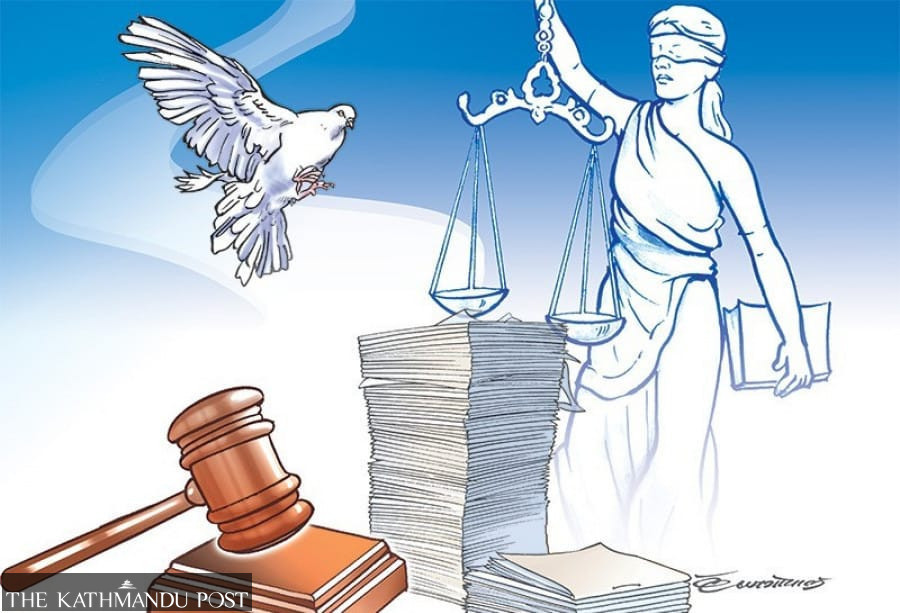National
International rights groups slam bill on transitional justice law
The bill, if adopted in its current form, will not adequately provide for the effective prosecution of serious crimes under international law, the groups say.
Post Report
Three international human rights organisations have joined Nepal’s conflict victims and human rights activists in criticising the amendment bill on the Enforced Disappearances Enquiry, Truth and Reconciliation Commission Act saying the draft contradicts domestic laws.
Since it is not in line with Nepal’s international legal obligations, the bill will not provide justice to the victims, they argue.
Issuing a joint statement on Friday, Amnesty International, the Human Rights Watch, and the International Commission of Jurists said the bill, if adopted in its existing form, will not adequately provide for an effective prosecution of serious crimes under international law. They have also questioned the reluctance of the government to take proper consultations with the victims over the content of the draft legislation, arguing it has seriously undermined credibility with its current approach.
The international watchdogs have demanded a revision of the bill so that it complies with the Supreme Court’s rulings and international human rights law and standards before its parliamentary endorsement. The revision process, they say, should ensure adequate consultation with conflict victims on the content of the proposed legislation.
Conflict victims and human rights activists have been objecting to the bill and demanding revision of several provisions before it is tabled for a vote in the federal parliament. Insurgency-era victims, afflicted by both the state and the Maoist sides, said the legitimacy of the transitional justice process will always come under question if it fails to address their concerns.
On March 9, the Pushpa Kamal Dahal administration registered the bill in the House of Representatives retaining all the disputed provisions of an earlier bill, which the government had withdrawn from parliament last year after widespread criticism. The three international organisations had expressed serious reservations in the previous bill as well.
“Key provisions of this bill appear to be designed to shield alleged perpetrators from prosecution for some of the most serious crimes under international law,” Dinushika Dissanayake, Amnesty International’s deputy regional director for South Asia, was quoted as saying in the statement. “If it is rushed through Parliament without significant changes, it cannot be the basis for a process that has the support of conflict victims, nor will it have any legal credibility at home or abroad.”
Both the state security forces and the then Maoist insurgents committed serious human rights crimes and violations of international humanitarian law during the armed conflict in Nepal from 1996 to 2006. The Comprehensive Peace Agreement that ended the insurgency included a commitment to setting up a truth and reconciliation commission “to investigate [the] truth about people seriously violating human rights and being involved in crimes against humanity”.
However, the governments, led successively by all major political parties, have blocked efforts at truth and justice, according to the statement.
The present bill, if endorsed in the current form, would allow many people, allegedly responsible for abuses amounting to crimes under international law, to evade justice. It would result in the Nepali justice system continuing to abandon many victims and survivors, some of whom have waited two decades for truth and redressal. “There have been almost no successful prosecutions of serious crimes under international law since the conflict ended in 2006,” said the statement.
In the statement, the international human rights organisations have pointed out several problems in the bill. Along with the flaw in the categorisation of serious and non-serious human rights violations, the bill also fails to establish a special investigation unit to collect evidence. It also fails to clarify how the principle of non-retroactivity of criminal law would apply in a manner consistent with international law.
International law requires the prosecution of certain serious crimes, such as torture and enforced disappearance, if warranted by evidence, irrespective of whether they were crimes under domestic law when they were committed, according to the statement.
“The bill fails to clarify which ‘applicable law’ would be used to prosecute those involved in serious crimes. The Penal Code, which came into force in 2018, prevents retroactive applicability of its provisions. Moreover, the Penal Code includes statutory limitations for the crimes of rape, torture and enforced disappearances,” said the statement.
The international human rights organisations also said the provision that the judges in the Special Court would be appointed in consultation with the Judicial Council doesn’t ensure transparency of their appointment.
“Once again, Nepal’s political leaders are attempting to legislate an escape hatch for some of those responsible for serious crimes under international law,” Meenakshi Ganguli, South Asia director at Human Rights Watch, was quoted in the statement as saying. “After over 16 years of trying and failing with this strategy, it should be clear to them that only a credible and legitimate justice process will successfully complete the peace process.”
They have also urged the United Nations and other diplomatic partners of Nepal to speak up on the matter.
“The UN and Nepal’s diplomatic partners should make it clear that only a process that meets international legal standards can receive international support and recognition, and insist on justice for serious crimes under international law so that victims have the opportunity to see perpetrators held to account,” the rights group said.




 11.12°C Kathmandu
11.12°C Kathmandu













